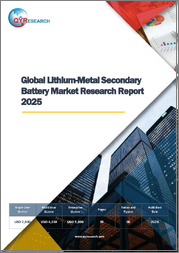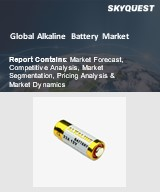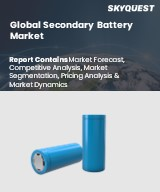
|
시장보고서
상품코드
1722914
2차전지 시장 규모, 점유율, 동향, 예측 : 유형별, 용도별, 업계별, 지역별(2025-2033년)Secondary Battery Market Size, Share, Trends and Forecast by Type, Application, Industry Vertical, and Region, 2025-2033 |
||||||
2차전지 세계 시장 규모는 2024년 1,278억 6,000만 달러에 달했습니다. 향후 IMARC Group은 이 시장이 2033년까지 2,768억 3,000만 달러에 달하고, 2025-2033년 8.51%의 연평균 복합 성장률(CAGR)을 보일 것으로 예측했습니다. 현재 아시아태평양이 시장을 독점하고 있으며, 2024년 2차전지 시장 점유율은 46.8% 이상에 달했습니다. 2차전지 시장은 전기자동차(EV), 재생에너지 통합을 위한 에너지 저장 솔루션, 가전제품의 채택 확대로 확대되고 있습니다. 또한, 배터리 기술 혁신, 환경 인식 증가, 유리한 정부 정책도 시장 성장의 주요 촉진요인으로 작용하고 있습니다. 산업 응용의 확대와 전력망 현대화도 시장 확대에 크게 기여하고 있습니다.
2차전지는 화학 에너지를 저장하고 필요에 따라 전기 에너지로 변환하는 축전지 또는 충전식 배터리입니다. 2차전지는 경제적이고, 1차전지보다 높은 출력 밀도, 적당한 방전 속도, 저온 성능을 제공합니다. 그 결과, 전자기기, 휴대폰, 하이브리드 전기자동차(HEV)의 전원으로 사용되고 있습니다. 현재 여러 제조업체들이 새로운 2차전지를 출시하고 있으며, 예를 들어 넓은 유역을 이용하여 대규모(GWh)의 에너지 저장을 저렴한 가격으로 가능하게 하는 플로우 배터리가 있습니다.
2차전지 시장 동향 :
세계 인터넷 보급과 소비자의 구매욕구 증가로 인해 휴대폰, 스피커, 노트북 등 휴대용 전자제품의 판매가 증가하고 있는 것이 시장 성장을 강화하는 주요 요인 중 하나입니다. 또한, 기존 자동차 관련 온실가스(GHG) 배출에 대한 개인들의 인식이 높아지면서 전기자동차(EV) 트렌드가 부상하고 있는 것도 시장 성장에 기여하고 있습니다. 이는 일부 국가 정부가 전기차 제조업체에 제공하는 세제 혜택과 보조금에 기인합니다. 이 외에도 재생 가능 에너지에 대한 투자 증가, 효율적인 에너지 저장 장치에 대한 수요 증가, 낮은 2차전지 유지보수 비용 등이 시장을 견인하는 주요 요인으로 작용하고 있습니다. 이와 더불어 급속한 도시화로 인한 전 세계 에너지 소비 증가와 잦은 전력 공급 중단 사례 증가는 전력 백업용 2차전지에 대한 수요를 불러일으키고 있습니다. 또한, 2차전지는 최소한의 스트레스로 초고속 충전이 가능하고 높은 비에너지를 제공하기 때문에 전 세계 전동공구, 의료기기, 항공, 산업용도에 널리 채택되고 있습니다.
본 보고서에서 다룬 주요 질문
- 2차전지 시장 규모는?
- 2차전지 시장 전망은?
- 2차전지 시장을 주도하는 주요 요인은?
- 2차전지 시장에서 가장 큰 점유율을 차지하는 지역은?
- 세계 2차전지 시장의 주요 기업은?
목차
제1장 서문
제2장 조사 범위와 조사 방법
- 조사 목적
- 이해관계자
- 데이터 소스
- 1차 정보
- 2차 정보
- 시장 추정
- 보텀업 접근
- 톱다운 접근
- 조사 방법
제3장 주요 요약
제4장 서론
- 개요
- 주요 업계 동향
제5장 세계의 2차전지 시장
- 시장 개요
- 시장 실적
- COVID-19의 영향
- 시장 예측
제6장 시장 분석 : 유형별
- 납축전지
- 리튬이온(Li-ion)
- 니켈 수소
- 기타
제7장 시장 분석 : 용도별
- 일렉트로닉스
- 자동차
- 산업용 배터리
- 휴대용 디바이스
- 기타
제8장 시장 분석 : 업계별
- 화학 및 석유화학
- 석유 및 가스
- 에너지 및 전력
- 자동차
- 기타
제9장 시장 분석 : 지역별
- 북미
- 미국
- 캐나다
- 아시아태평양
- 중국
- 일본
- 인도
- 한국
- 호주
- 인도네시아
- 기타
- 유럽
- 독일
- 프랑스
- 영국
- 이탈리아
- 스페인
- 러시아
- 기타
- 라틴아메리카
- 브라질
- 멕시코
- 기타
- 중동 및 아프리카
- 시장 내역 : 국가별
제10장 SWOT 분석
- 개요
- 강점
- 약점
- 기회
- 위협
제11장 밸류체인 분석
제12장 Porter의 Five Forces 분석
- 개요
- 바이어의 교섭력
- 공급 기업의 교섭력
- 경쟁 정도
- 신규 진출업체의 위협
- 대체품의 위협
제13장 가격 분석
제14장 경쟁 구도
- 시장 구조
- 주요 기업
- 주요 기업 개요
- Amperex Technology Limited(TDK Corporation)
- Byd Company Limited
- Duracell Inc.(Berkshire Hathaway Inc.)
- Energizer Holdings Inc.
- EnerSys
- LG Chem Ltd.
- Panasonic Corporation
- Saft(TotalEnergies SE)
- Samsung SDI Co. Ltd.
- Showa Denko K. K.
- Sony Group Corporation
- Tianjin Lishen Battery Joint-Stock Co. Ltd.
The global secondary battery market size was valued at USD 127.86 Billion in 2024. Looking forward, IMARC Group estimates the market to reach USD 276.83 Billion by 2033, exhibiting a CAGR of 8.51% from 2025-2033. Asia Pacific currently dominates the market, holding a secondary battery market share of over 46.8% in 2024. The secondary battery market is expanding due to the growing adoption of electric vehicles (EVs), energy storage solutions for renewable energy integration, and consumer electronics. Innovations in battery technology, increasing environmental awareness, and favorable government policies are also key drivers of market growth. Expanding industrial applications and grid modernization also contribute significantly to market expansion.
Secondary batteries are accumulators or rechargeable batteries that store chemical energy and convert it into electrical energy depending on the requirement. These batteries are economical and offer high power density, reasonable discharge rate, and low-temperature performance than primary batteries. As a result, they are used to power electronic devices, cellular phones, and hybrid electric vehicles (HEVs). At present, several manufacturers are introducing novel secondary batteries, such as a flow cell battery that allows large-scale (GWh) energy storage using wide basins at a low price.
Secondary Battery Market Trends:
The boosting sales of portable electronic devices, such as mobiles, speakers, and laptops, due to the escalating internet penetration and rising purchasing capacity of consumers worldwide represent one of the key factors strengthening the growth of the market. Moreover, the emerging trend of electric vehicles (EVs) on account of the rising awareness among individuals about greenhouse gas (GHG) emissions associated with conventional automobiles is contributing to the market growth. This can also be accredited to tax incentives and subsidies offered by governments of several countries to EV manufacturers. Apart from this, increasing investments in renewable energy, the rising need for efficient energy storage devices, and low maintenance costs of secondary batteries are other significant factors driving the market. In addition to this, the growing energy consumption worldwide due to rapid urbanization and increasing instances of frequent power supply interruptions is catalyzing the demand for secondary batteries for power backup. Besides this, as secondary batteries allow ultra-fast charging with minimal stress and provide high specific energy, they are gaining widespread adoption in power tools, medical devices, aviation, and industrial applications around the world.
Key Market Segmentation:
Breakup by Type:
- Lead Acid
- Lithium-Ion (Li-ion)
- Nickel Metal Hydride
- Others
Breakup by Application:
- Electronics
- Motor Vehicles
- Industrial Batteries
- Portables Devices
- Others
Breakup by Industry Vertical:
- Chemical and Petrochemical
- Oil and Gas
- Energy and Power
- Automotive
- Others
Breakup by Region:
- North America
- United States
- Canada
- Asia-Pacific
- China
- Japan
- India
- South Korea
- Australia
- Indonesia
- Others
- Europe
- Germany
- France
- United Kingdom
- Italy
- Spain
- Russia
- Others
- Latin America
- Brazil
- Mexico
- Others
- Middle East and Africa
Competitive Landscape:
The competitive landscape of the industry has also been examined along with the profiles of the key players being Amperex Technology Limited (TDK Corporation), Byd Company Limited, Duracell Inc. (Berkshire Hathaway Inc.), Energizer Holdings Inc., EnerSys, LG Chem Ltd., Panasonic Corporation, Saft (TotalEnergies SE), Samsung SDI Co. Ltd., Showa Denko K. K., Sony Group Corporation and Tianjin Lishen Battery Joint-Stock Co. Ltd.
Key Questions Answered in This Report
- 1.How big is the secondary battery market?
- 2.What is the future outlook of secondary battery market?
- 3.What are the key factors driving the secondary battery market?
- 4.Which region accounts for the largest secondary battery market share?
- 5.Which are the leading companies in the global secondary battery market?
Table of Contents
1 Preface
2 Scope and Methodology
- 2.1 Objectives of the Study
- 2.2 Stakeholders
- 2.3 Data Sources
- 2.3.1 Primary Sources
- 2.3.2 Secondary Sources
- 2.4 Market Estimation
- 2.4.1 Bottom-Up Approach
- 2.4.2 Top-Down Approach
- 2.5 Forecasting Methodology
3 Executive Summary
4 Introduction
- 4.1 Overview
- 4.2 Key Industry Trends
5 Global Secondary Battery Market
- 5.1 Market Overview
- 5.2 Market Performance
- 5.3 Impact of COVID-19
- 5.4 Market Forecast
6 Market Breakup by Type
- 6.1 Lead Acid
- 6.1.1 Market Trends
- 6.1.2 Market Forecast
- 6.2 Lithium-Ion (Li-ion)
- 6.2.1 Market Trends
- 6.2.2 Market Forecast
- 6.3 Nickel Metal Hydride
- 6.3.1 Market Trends
- 6.3.2 Market Forecast
- 6.4 Others
- 6.4.1 Market Trends
- 6.4.2 Market Forecast
7 Market Breakup by Application
- 7.1 Electronics
- 7.1.1 Market Trends
- 7.1.2 Market Forecast
- 7.2 Motor Vehicles
- 7.2.1 Market Trends
- 7.2.2 Market Forecast
- 7.3 Industrial Batteries
- 7.3.1 Market Trends
- 7.3.2 Market Forecast
- 7.4 Portables Devices
- 7.4.1 Market Trends
- 7.4.2 Market Forecast
- 7.5 Others
- 7.5.1 Market Trends
- 7.5.2 Market Forecast
8 Market Breakup by Industry Vertical
- 8.1 Chemical and Petrochemical
- 8.1.1 Market Trends
- 8.1.2 Market Forecast
- 8.2 Oil and Gas
- 8.2.1 Market Trends
- 8.2.2 Market Forecast
- 8.3 Energy and Power
- 8.3.1 Market Trends
- 8.3.2 Market Forecast
- 8.4 Automotive
- 8.4.1 Market Trends
- 8.4.2 Market Forecast
- 8.5 Others
- 8.5.1 Market Trends
- 8.5.2 Market Forecast
9 Market Breakup by Region
- 9.1 North America
- 9.1.1 United States
- 9.1.1.1 Market Trends
- 9.1.1.2 Market Forecast
- 9.1.2 Canada
- 9.1.2.1 Market Trends
- 9.1.2.2 Market Forecast
- 9.1.1 United States
- 9.2 Asia-Pacific
- 9.2.1 China
- 9.2.1.1 Market Trends
- 9.2.1.2 Market Forecast
- 9.2.2 Japan
- 9.2.2.1 Market Trends
- 9.2.2.2 Market Forecast
- 9.2.3 India
- 9.2.3.1 Market Trends
- 9.2.3.2 Market Forecast
- 9.2.4 South Korea
- 9.2.4.1 Market Trends
- 9.2.4.2 Market Forecast
- 9.2.5 Australia
- 9.2.5.1 Market Trends
- 9.2.5.2 Market Forecast
- 9.2.6 Indonesia
- 9.2.6.1 Market Trends
- 9.2.6.2 Market Forecast
- 9.2.7 Others
- 9.2.7.1 Market Trends
- 9.2.7.2 Market Forecast
- 9.2.1 China
- 9.3 Europe
- 9.3.1 Germany
- 9.3.1.1 Market Trends
- 9.3.1.2 Market Forecast
- 9.3.2 France
- 9.3.2.1 Market Trends
- 9.3.2.2 Market Forecast
- 9.3.3 United Kingdom
- 9.3.3.1 Market Trends
- 9.3.3.2 Market Forecast
- 9.3.4 Italy
- 9.3.4.1 Market Trends
- 9.3.4.2 Market Forecast
- 9.3.5 Spain
- 9.3.5.1 Market Trends
- 9.3.5.2 Market Forecast
- 9.3.6 Russia
- 9.3.6.1 Market Trends
- 9.3.6.2 Market Forecast
- 9.3.7 Others
- 9.3.7.1 Market Trends
- 9.3.7.2 Market Forecast
- 9.3.1 Germany
- 9.4 Latin America
- 9.4.1 Brazil
- 9.4.1.1 Market Trends
- 9.4.1.2 Market Forecast
- 9.4.2 Mexico
- 9.4.2.1 Market Trends
- 9.4.2.2 Market Forecast
- 9.4.3 Others
- 9.4.3.1 Market Trends
- 9.4.3.2 Market Forecast
- 9.4.1 Brazil
- 9.5 Middle East and Africa
- 9.5.1 Market Trends
- 9.5.2 Market Breakup by Country
- 9.5.3 Market Forecast
10 SWOT Analysis
- 10.1 Overview
- 10.2 Strengths
- 10.3 Weaknesses
- 10.4 Opportunities
- 10.5 Threats
11 Value Chain Analysis
12 Porters Five Forces Analysis
- 12.1 Overview
- 12.2 Bargaining Power of Buyers
- 12.3 Bargaining Power of Suppliers
- 12.4 Degree of Competition
- 12.5 Threat of New Entrants
- 12.6 Threat of Substitutes
13 Price Analysis
14 Competitive Landscape
- 14.1 Market Structure
- 14.2 Key Players
- 14.3 Profiles of Key Players
- 14.3.1 Amperex Technology Limited (TDK Corporation)
- 14.3.1.1 Company Overview
- 14.3.1.2 Product Portfolio
- 14.3.2 Byd Company Limited
- 14.3.2.1 Company Overview
- 14.3.2.2 Product Portfolio
- 14.3.2.3 Financials
- 14.3.2.4 SWOT Analysis
- 14.3.3 Duracell Inc. (Berkshire Hathaway Inc.)
- 14.3.3.1 Company Overview
- 14.3.3.2 Product Portfolio
- 14.3.4 Energizer Holdings Inc.
- 14.3.4.1 Company Overview
- 14.3.4.2 Product Portfolio
- 14.3.4.3 Financials
- 14.3.4.4 SWOT Analysis
- 14.3.5 EnerSys
- 14.3.5.1 Company Overview
- 14.3.5.2 Product Portfolio
- 14.3.5.3 Financials
- 14.3.5.4 SWOT Analysis
- 14.3.6 LG Chem Ltd.
- 14.3.6.1 Company Overview
- 14.3.6.2 Product Portfolio
- 14.3.6.3 Financials
- 14.3.6.4 SWOT Analysis
- 14.3.7 Panasonic Corporation
- 14.3.7.1 Company Overview
- 14.3.7.2 Product Portfolio
- 14.3.7.3 Financials
- 14.3.7.4 SWOT Analysis
- 14.3.8 Saft (TotalEnergies SE)
- 14.3.8.1 Company Overview
- 14.3.8.2 Product Portfolio
- 14.3.9 Samsung SDI Co. Ltd.
- 14.3.9.1 Company Overview
- 14.3.9.2 Product Portfolio
- 14.3.9.3 Financials
- 14.3.9.4 SWOT Analysis
- 14.3.10 Showa Denko K. K.
- 14.3.10.1 Company Overview
- 14.3.10.2 Product Portfolio
- 14.3.10.3 Financials
- 14.3.10.4 SWOT Analysis
- 14.3.11 Sony Group Corporation
- 14.3.11.1 Company Overview
- 14.3.11.2 Product Portfolio
- 14.3.12 Tianjin Lishen Battery Joint-Stock Co. Ltd.
- 14.3.12.1 Company Overview
- 14.3.12.2 Product Portfolio
- 14.3.1 Amperex Technology Limited (TDK Corporation)



















